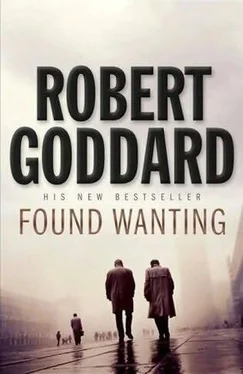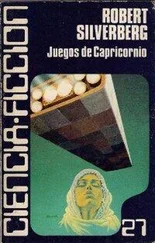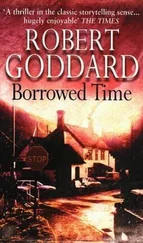‘Know what… Mr Eusden?’ Kjeldsen asked, blatantly prevaricating.
‘How do you know there’s nothing to say who owns the case? Your former secretary will have broken it open before discarding it, won’t she? How do you know Marty’s name and address aren’t inside?’
‘I believe…’ Kjeldsen resorted to his cigarette to win further thinking time, but it had burned down nearly to the filter and he was obliged to content himself with a protracted stubbing-out. Then: ‘I believe Mr Hewitson said so. Or perhaps it was… Ms Shadbolt.’
The man was lying. That was clear. But just how big was the lie? ‘Where does your ex-secretary live, Hr Kjeldsen?’
‘I cannot tell you that, Mr Eusden. It is… a police matter. But they have promised to be in touch. And I will contact you as soon as I hear from them. You are staying at the Phoenix, yes?’
‘Yes.’
‘Well, wait for news, then, Mr Eusden. I am sorry. I am… professionally embarrassed. For such a thing to happen is… awful. I blame drugs. I suspect my secretary had… an expensive habit. Employing the right people… is so difficult.’
‘That’s certainly true.’ Eusden looked Kjeldsen in the eye, letting him understand exactly what he meant.
‘Please give my… personal apologies… to Mr Hewitson. All we can do now is… hope the police get lucky.’
‘You’ll let them know about the case?’
‘Most certainly.’
‘What’s the name of the officer handling the inquiry? I’d like to speak to him myself.’
Kjeldsen smiled unreassuringly. ‘Why would you want to do that?’
‘To make sure every effort to find the case is being made.’
‘You can leave that to me, Mr Eusden. I am sorry to say many of our police officers speak rather poor English. There would be confusion, miscommunication. I will ensure they do everything they need to do. And I will keep you informed of progress.’
‘If there is any.’
‘Let us say when there is any.’ Kjeldsen’s smile remained fixed in place. ‘We must try to be positive.’
Eusden was angry and frustrated. Angry because he was convinced it was Kjeldsen, not his phantom former secretary, who had stolen the case. Frustrated because he could hardly go straight to the police and confirm they had received no report of a burglary in Jorcks Passage, then lodge a complaint against Kjeldsen, since Marty had made it very clear police involvement in his activities was something he wished to avoid at all costs. Kjeldsen probably knew that and was trading on it. He must have broken into the case and judged he could make a lot of money out of the contents. How was an open question; how soon the more pressing issue.
Eusden had to speak to Marty. That at least was certain. But he would not be able to do so for several hours. A message was waiting for him at the Phoenix. Catching 11.54 train. Meet you at the hotel 4 p.m. Marty. Marty had been phoneless since Straub had stolen his mobile and would probably have kept it switched off even if he still had one. It would be mid-afternoon before Eusden could speak to him, out at the airport Hilton, a long way from Jorcks Passage.
That could not be helped. Or could it? Eusden suddenly realized there was a way to bring forward their meeting by an hour or so. Marty would have to change trains at Copenhagen central station and Eusden could be waiting for him when he stepped off the 11.54 from Århus.
That still left him with time to kill, which he resolved to put to good purpose by harassing Kjeldsen. He returned to Jorcks Passage and phoned the slippery lawyer on his mobile while loitering in the entrance to the arcade.
‘Any news from the police, Hr Kjeldsen?’
‘I regret not, Mr Eusden. But it is only… just over an hour… since we met. These things take time. Have you spoken with Mr Hewitson?’
‘Not yet. He’s arriving in Copenhagen later today. I’m sure he’ll want to hear your explanation of what happened in person.’
‘Bring him to see me, then. What time will he be arriving?’
‘We could be with you by five.’
I will expect you then.’
Eusden continued to loiter and was rewarded, twenty minutes later, by the sight of Kjeldsen emerging from the entrance to his office’s stairway at the other end of the arcade, muffled up in loden coat and scarf. He ambled off along Skindergade and Eusden followed at a discreet distance. There were enough shoppers about, and office workers taking their lunch breaks, for him to blend into the background. Kjeldsen appeared wholly unconcerned about the possibility of being tailed. An Italian restaurant in a small square nearby turned out to be his destination.
There was a café opposite, where Eusden nabbed a table with a suitable eyeline and washed a toasted sandwich down with a couple of Tuborg Grøns while monitoring Kjeldsen’s activities. He emerged from the restaurant after forty minutes or so, patting his stomach contentedly like someone who had put away a table d’hôte lunch with expeditious relish. Eusden had already settled up and exited with the lawyer still in view. Kjeldsen popped into a secondhand bookshop for a few minutes on his way back to Jorcks Passage, rounding off an entirely convincing performance in the role of a man going about his customary lunchtime routine.
Eusden had learnt nothing of the remotest value. He decided to head for the station.
The 11.54 from Århus, it transpired, ran through to the airport. Marty would not be getting off; Eusden would be getting on. He eked out an hour sipping Americanos in a coffee shop, watching the sky darken over Rådhuspladsen. Sleety rain began to fall. Eventually, the time came for him to return to the station.
He bought his ticket and went down to the platform. The Københavns Lufthavn train rolled in on schedule at 3.20. He did not catch sight of Marty as the carriages decelerated past him, but there were lots of people rising from their seats to disembark. He would find him soon enough.
The train had an eight-minute lay-over before proceeding. Eusden waited to see if Marty would get off for a smoke. He did not. Eusden boarded at the front and started working his way through the carriages. He reached the other end before the eight minutes were up. Marty was nowhere to be seen. He started retracing his steps. The train left the station. Still he could not find Marty.
It was a twelve-minute run to the airport. Long before the train arrived, Eusden knew what he could not quite bring himself to believe: Marty was not aboard.
He lingered in the foyer of the airport Hilton until gone four o’clock, clinging to the frail hope that Marty would still turn up. He did not. And it became bleakly obvious to Eusden that he was never going to. He phoned Århus Kommunehospital, who confirmed Marty had discharged himself earlier in the day; he was no longer any concern of theirs.
But he remained of great concern to Eusden, who could think only of sinister explanations for his friend’s failure to make it to Copenhagen. He phoned the Phoenix. There was no message for him, from Marty or anyone else. But Marty’s earlier message had been clear. Catching 11.54 train. Yet he had not caught it. Or if he had, he had got off somewhere along the way. Why would he have done that? He had been intent on reaching Copenhagen that day. Hence his insistence on leaving the hospital. He would surely not have got off the train unless compelled to do so.
Eusden thought about the van that had nearly run Marty down and the car crash that had killed Burgaard. He wondered, chillingly, if he had made it to Copenhagen himself only because whoever had run Burgaard off the road thought he was in the car as well. That made his survival an oversight, a discrepancy to be corrected as soon as it was deemed convenient.
Читать дальше












